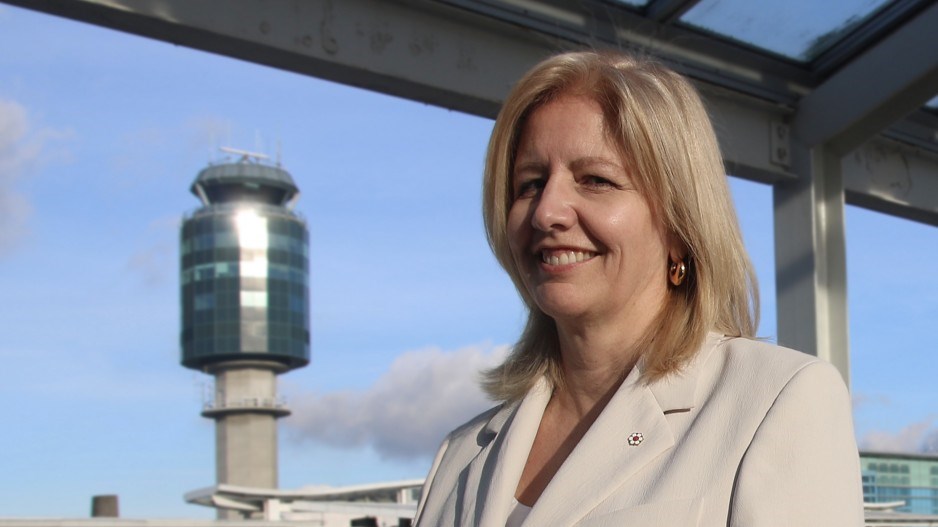Workers laid off from jobs at Vancouver International Airport (YVR) are being recalled to help B.C.'s vaccination effort, Vancouver Airport Authority (VAA) CEO Tamara Vrooman told a Greater Vancouver Board of Trade audience March 10.
Employers at the airport laid off a significant number of the approximately 26,000 people who worked at the facility pre-pandemic. That includes the VAA laying off about 25% of its 550 employees in May, and only recalling a small number of those workers since then.
Many have skills that the province needs in ensuring a smooth roll-out of COVID-19 vaccines.
Vrooman explained to BIV, after her presentation, that the partnership with Vancouver Coastal Health involves workers who were laid off across a range of employers at YVR. All recalled workers will be put on the VAA's payroll, and then the VAA will be reimbursed for their wages by the province.
Approximately 100 workers will be part of this program when it launches in the coming weeks, Vrooman said. Many more are likely to be added but Vrooman would not estimate exactly how many workers could be involved.
The workers would not necessarily be putting vaccine in people's arms. Instead, they could be speaking with those who are about to be vaccinated, taking sensitive information and helping those individuals navigate through the secure process in an orderly way, Vrooman said.
Many of the workers speak a range of languages, and that could come in handy at putting people at ease, she added. Others might help with traffic control, and helping people get to their cars.
The B.C. government has come under fire for what has so far been a slow roll-out of vaccinations. It has also been criticized for launching on March 8 a phone registration system in conjunction with Telus Corp.
That system attracted more than two million phone calls, with the vast majority of those calling not able to get through to agents to book vaccination appointments.
Earlier this month, provincial health officer Bonnie Henry and Health Minister Adrian Dix released a statement to say that a provincial health order was tweaked to expand the range of health professions and occupations from which vaccination-effort staff could be hired.
That expanded list includes "dentists, midwives, pharmacy technicians, paramedics, firefighters and retired nurses," according to Henry and Dix on March 1.
Vrooman's revelation came as part of an update on airport operations that included new information on airport finances, data on passenger volume and a sense of how staff are taking advantage of having an empty terminal.
She also praised the provincial government's announcement yesterday that it will provide $27.2 million in grants to operators of inter-city buses, and regional airports.
She stressed how important regional airports are, while adding that YVR's success is key to the province's economy.
Vrooman said the airport last year was able to achieve a waiver of bond covenants, which allows it to have free cash flow for the next three years – sufficient time to restructure and adapt to what could soon be a post-pandemic world.
"We were also able to issue $600 million worth of debt," Vrooman said. "We were oversubscribed at a rate of three to one. We could easily have raised $1.8 billion in the fall of this past year for our airport, and we enjoyed the lowest financing [rate] in the history of airports in Canada."
Vrooman shared data showing that airport passenger volume fell 72.3%, with cargo volume falling 19%.
Passenger volume has fallen even more since then, while the cargo-volume decline has stayed steady.
Yesterday, on March 9, there were 4,340 passengers on flights that either arrived or departed YVR. One year ago, on March 9, there were 50,278 passengers on those flights. That is a 91.4% decline for that day year-over-year.
"What we're seeing at the moment is mostly domestic traffic," Vrooman said.
That traffic is "mostly concentrated in Western Canada – over 70% of our traffic these days is domestic, mostly essential workers, going back and forth, up north."
She said international travel "has gone to a trickle," although there was some travel by international students later last year.
"We've seen very, very little [volume] coming to and from the United States," she said.
The good news, she said, is that the airport's passenger volumes will grow at rates previously unimagined.
She also joked that "a crisis is a terrible thing to waste," before revealing that airport has been making virtual reality videos to film the airport's interior and exterior in granular detail.
Flyovers by helicopters have been able to record extremely high-resolution images, she said.
Reopening the airport to larger numbers of travellers will come slower than did the abrupt shutdown, Vrooman said, but she remains positive about the future.
"As we look to 2022 and beyond, we think we have a bright future," she said.



